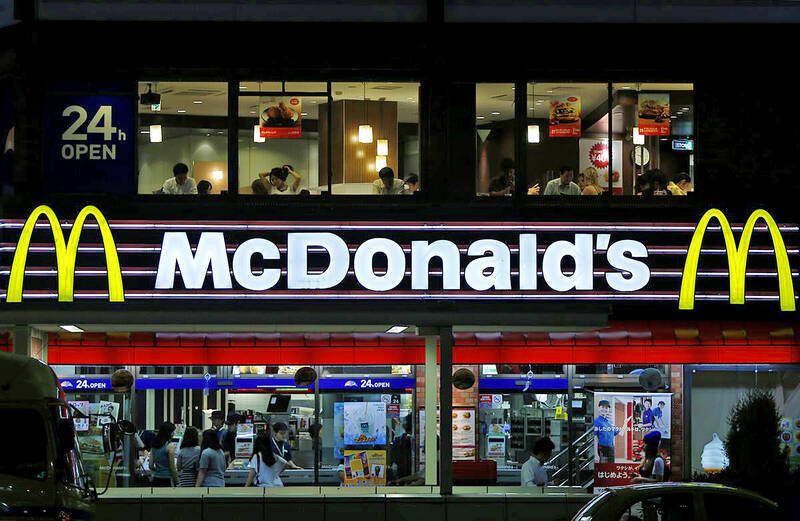Japan’s McDonald’s fast-food restaurants would raise prices on about 60 percent of its offerings to customers, fueled by rising input costs and exchange-rate fluctuations, the company said yesterday.
It marks the company’s second set of price increases this year as Japan grapples with inflationary pressures and a slide in the yen to a 24-year low, making imported ingredients more expensive.
From Friday, the cost of the signature Big Mac hamburger is to increase to ¥410 (US$2.85) from ¥390, McDonald’s Holding Co Japan Ltd said in a statement, reflecting increases of ¥10 to ¥30 on many items.

Photo: REUTERS
A Big Mac costs US$5.15 in the US, according to The Economist magazine’s index of prices worldwide. The price difference implied that Japan’s currency was undervalued by 45 percent, according to the gauge when it was last updated in July.
McDonald’s Japan is raising prices for the second time this year on its cheeseburgers, which would cost ¥180 each from Friday from ¥140 at the beginning of the year.
Rising production costs and the yen’s slide have spurred price increases by 60 percent of major Japanese restaurants, according to a survey issued this month by Tokyo Shoko Research.
Separately, Mister Donut shops in Japan are to raise prices on most items by about 7.4 percent from Nov. 25, said its parent company, Duskin Co.
Meanwhile, Japanese Minister of Finance Shunichi Suzuki continued to show readiness to act against speculative moves in the foreign exchange market, following Thursday’s direct actions that triggered major yen gains.
“We’re strongly concerned about speculative moves, and there’s no change in our stance that we’ll respond as needed,” Suzuki told reporters yesterday. “We’ll continue to monitor markets with urgency, and a deep sense of concern.”
Japan intervened to prop up the yen for the first time since 1998 on Thursday.
The move came after the yen fell past the key psychological level of ¥145 against the greenback, after Bank of Japan Governor Haruhiko Kuroda showed determination to stick with ultra-low rates for even longer than expected.
Kuroda said the government’s intervention in the foreign exchange market last week was appropriate given the recent volatility in the yen.
Additional reporting by Bloomberg

On Tuesday, US President Donald Trump weighed in on a pressing national issue: The rebranding of a restaurant chain. Last week, Cracker Barrel, a Tennessee company whose nationwide locations lean heavily on a cozy, old-timey aesthetic — “rocking chairs on the porch, a warm fire in the hearth, peg games on the table” — announced it was updating its logo. Uncle Herschel, the man who once appeared next to the letters with a barrel, was gone. It sparked ire on the right, with Donald Trump Jr leading a charge against the rebranding: “WTF is wrong with Cracker Barrel?!” Later, Trump Sr weighed

HEADWINDS: Upfront investment is unavoidable in the merger, but cost savings would materialize over time, TS Financial Holding Co president Welch Lin said TS Financial Holding Co (台新新光金控) said it would take about two years before the benefits of its merger with Shin Kong Financial Holding Co (新光金控) become evident, as the group prioritizes the consolidation of its major subsidiaries. “The group’s priority is to complete the consolidation of different subsidiaries,” Welch Lin (林維俊), president of the nation’s fourth-largest financial conglomerate by assets, told reporters during its first earnings briefing since the merger took effect on July 24. The asset management units are scheduled to merge in November, followed by life insurance in January next year and securities operations in April, Lin said. Banking integration,

LOOPHOLES: The move is to end a break that was aiding foreign producers without any similar benefit for US manufacturers, the US Department of Commerce said US President Donald Trump’s administration would make it harder for Samsung Electronics Co and SK Hynix Inc to ship critical equipment to their chipmaking operations in China, dealing a potential blow to the companies’ production in the world’s largest semiconductor market. The US Department of Commerce in a notice published on Friday said that it was revoking waivers for Samsung and SK Hynix to use US technologies in their Chinese operations. The companies had been operating in China under regulations that allow them to import chipmaking equipment without applying for a new license each time. The move would revise what is known

Artificial intelligence (AI) chip designer Cambricon Technologies Corp (寒武紀科技) plunged almost 9 percent after warning investors about a doubling in its share price over just a month, a record gain that helped fuel a US$1 trillion Chinese market rally. Cambricon triggered the selloff with a Thursday filing in which it dispelled talk about nonexistent products in the pipeline, reminded investors it labors under US sanctions, and stressed the difficulties of ascending the technology ladder. The Shanghai-listed company’s stock dived by the most since April in early yesterday trading, while the market stood largely unchanged. The litany of warnings underscores growing scrutiny of